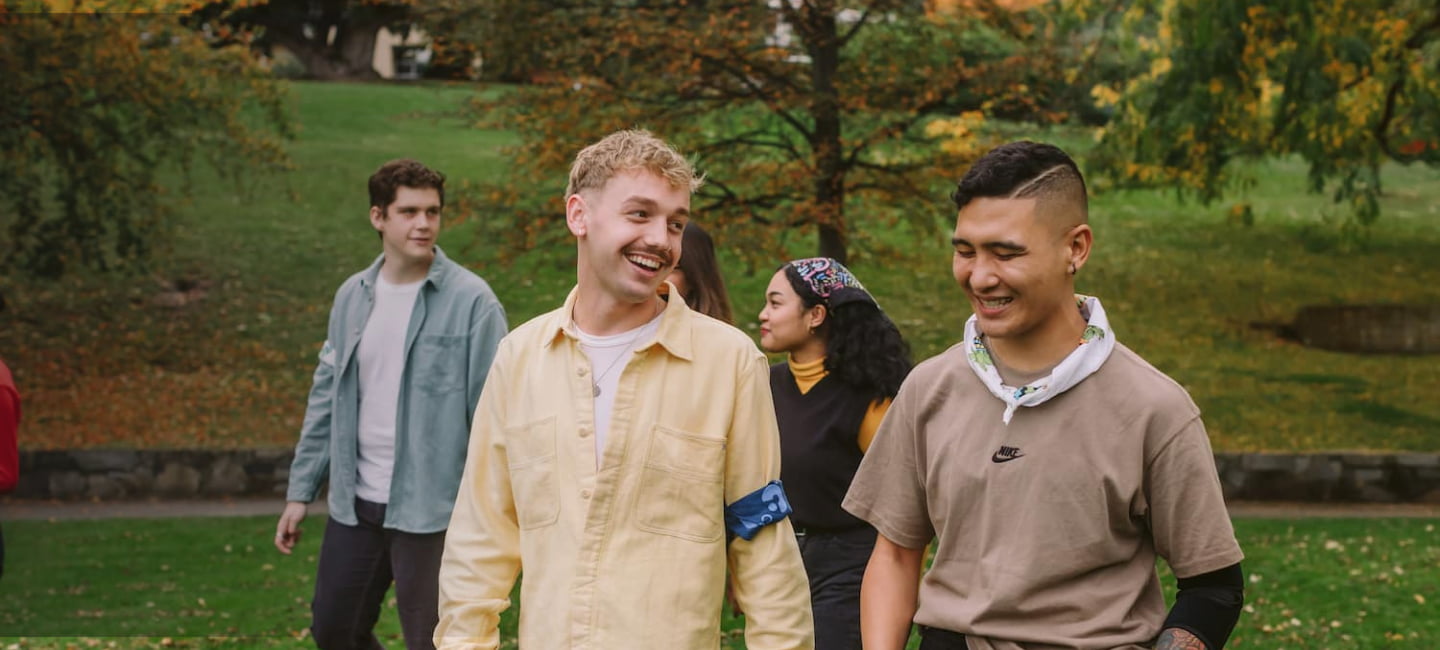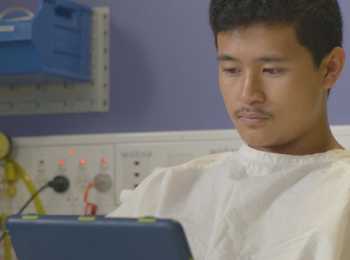Your friends are really important – you probably spend as much time with them (or more) as you do with your family.
Friends can be amazing and supportive, but cancer can shake even the strongest friendship. You may lose some friends and gain new ones.
You will go through a lot of changes because of cancer – like being in hospital a lot, not being able to do the same things you used to, and maybe acting or looking different. Your friends might find this difficult to deal with, and not be there for you as much as you’d like.
Maybe you haven’t told some friends yet because you’re worried about how they’ll react. But telling them about your cancer and how you’re feeling can be a huge relief and your friends can be a great source of support.
Here are some tips on talking to your friends about cancer:
- Make the first move.
- Your friends may be scared to say the wrong thing or to ask you a question. Often they will just say nothing – not because they don’t care, but more that they just don’t know what to say. As unfair as it seems, you may have to start the ball rolling.
- Tell them about Canteen’s helpful resources, where they can learn how to support someone with cancer and what to say to someone whose loved one has cancer. This can be a great first step in talking about cancer together.
- Remember they don’t mean to upset or annoy you.
- Sometimes your friends will say stuff that really annoys you and makes you angry. This can be really hard. But it’s usually because they don’t understand.
- Be prepared for strange questions.
- Remember all the things that you didn’t know before all this started? Your friends are in the same situation now. If there are questions you can’t or don’t want to answer, just let your friends know that you don’t feel like talking right now.
- Remember they have their own lives.
- It may seem that your friends are just getting on with their lives without you and you feel left out. Try not to be resentful and find ways to stay connected.
- Do some of the things you did together before cancer.
- Try to stay in touch and let your friends know that you still want to be part of what’s going on, even if you can’t always go out and do the same things.
- Tell them where to go (in a nice way!).
- Send them a link to Canteen where they can learn more about what you’re going through.
Making (and losing) friends
Common experiences often lead to new friendships. You may find it really helpful to connect with other young people who have lived through the same things you’re going through (try out Canteen Connect which is packed with other young people just like you). Lots of young people say this is the best support, because only other young people with cancer truly understand.
You may also lose some friends along the way. Not all your friends will be able to handle it. Some may even bully or exclude you, or say insensitive things, so you might decide to cut them off.
Sometimes friends are amazing. They say the right things and are there to lean on when you have cancer. But other times, friendships can start to feel complicated and confusing.
There are all sorts of reasons for this including:
- feeling crappy and irritable while you are being treated
- being in hospital a lot
- not being able to do the same things as you used to
- acting differently because of your diagnosis
- looking different because of treatment.
Sometimes friends can find all of this difficult to deal with and having positive people in your life is important right now.
It might seem like your friends aren’t texting you or inviting you out anymore. They might not visit you much. They might make insensitive jokes or say unhelpful things. They might not want to talk about the ‘C word’ and just pretend that nothing is wrong.
Having your close friends around is probably really important to you. You might feel hurt or disappointed that they are not better at being there for you when you really need their support.
But most people don’t have much experience dealing with someone with a serious illness like cancer, and they can act in these ways because they don’t know what to say or how to act.
It can help to think about the situation from their perspective. Some things to keep in mind include:
Friends sometimes don’t know what to say
Your friends may be scared to say the wrong thing or to ask you a question. So this may mean they just say nothing. If you want to talk, you may have to start the ball rolling. Canteen has a range of resources that can help your friends. Check out canteen.org.au/friends.
Friends won’t say things to deliberately upset you
It can be really upsetting when friends say stuff that upsets you, annoys you or makes you angry. It can be hard when you might already be feeling sick and vulnerable not to feel offended. Try to keep in mind that they are really unlikely trying to upset you on purpose; it’s just that they don’t understand. It’s okay to let them know how you feel and what you need from them. You can start with “You know, it bugs me when …”
You will probably be a bit snappy with your friends sometimes when you’re feeling down. It can help to let people know that you’re having a tough time and it’s impacting how you’re showing up with them. Talk to your friends and let them know how much they mean to you.
Friends may ask tough or silly questions
Be prepared for questions that may seem strange – your friends are probably curious about what you’re going through. But sometimes you may not want to answer questions about your diagnosis or treatment. It’s okay to let your friends know that you don’t feel like talking right now.
Your friends have their own lives
They may talk about what’s happening at school, uni or work and this may make you feel left out. Unfortunately, the world doesn’t stop for everyone else because you have been diagnosed with cancer (although for you it may seem like you have entered a whole different world).
Friends may change
Having positive people in your life is important. Some of your friends may stay with you and become an amazing source of support, able to listen to your complaints, fears and wishes. These are true friends, and you may become very close.
But not all of your friends will be able to understand what you’re going through and you lose touch with some people. If this happens, try not to let it get you down – friendships change all the time.
You may also change as cancer can give you a different outlook on life. You may not relate to your old friends as well.
You will find new friends
You may form new friendships. It can be really helpful to connect with other young people living with cancer. They might be easier to talk to about what is happening because they understand. Lots of young people say this is often the best support. Through Canteen, you can connect with other people in similar situations at events or online at Canteen Connect.
I had friends who left and friends who stayed. I am very grateful for my friends who stayed and helped me through the ups and downs of my cancer journey. Amy, 25
As unfair as it may seem, you may have to take the lead and teach your friends how to handle what is happening to you.
Tips to help you stay in touch with your friends:
- Invite them to visit you in hospital or at home.
- Use social media to stay in touch (see below).
- Ask them to keep calling, texting and messaging you and if you don’t feel like talking, you just won’t respond straight away.
- Ask them to keep inviting you to things and you’ll go when you can.
- Let them know that learning what you’re going through can help them understand. Canteen can help them with information and support and a booklet that may help.
- Remind your friends that you are still the same person.
- Tell your friends how they can help – many will be happy to do whatever they can to show they care.
Connecting through social media
When you are having treatment for cancer, it can become incredibly hard to see and stay in touch with your friends. You might also be away from family members and other important people to you if you are in hospital for a while or having treatment.
At other times social media can be a place that doesn’t make us feel very good and we need to take a break.
There are so many ways social media can be used in a positive way to help you manage the stresses of cancer. It is a great way to keep in contact with your friends when you might not be able to see them and spend as much time with them as you would like to.
Sometimes we can also get tired of answering the same questions over and over again. You (or a trusted family member or friend) can use social media and group chats to update friends and family about your treatment and other progress. You can send text or video messages (that you approve) to those you care about. This is a great way to avoid repeating information and to manage who you want to share updates with.
It can be helpful to set the expectation about what info is ‘public’, and what is just for those closest to you. Using closed or private social media accounts can be a great way to journal your story. You don’t need to share it with anyone at the time, but it can be there just for you.
It’s also a good idea to think carefully about how your name and image might be used in any personal fundraisers, or updates at your school or work – what you are comfortable with now, and what you are okay with being online and searchable in the future. It can help to talk with your family, the hospital social worker or Canteen about what information feels okay to share if a fundraiser is being organised.


















